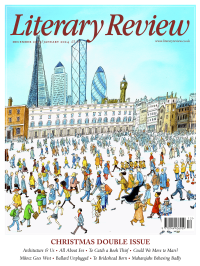Claudia FitzHerbert
Two’s Company
Twinkind: The Singular Significance of Twins
By William Viney
Thames & Hudson 224pp £25
When I found myself unexpectedly pregnant with twins more than thirty years ago, my doctor described identical twins, or monozygotes, as ‘a freak of nature which can happen to anyone’. Fraternal twins, by contrast, tend to run in families, or be the result of fertility treatment or the mother being older than I then was. So I prepared for monozygotes. The babies’ father, whom I didn’t know very well, said, ‘We can’t possibly have two babies looking the same; let’s decide now that we will treat one as a human and the other as a dog.’ I pushed back on that, but I did look forward to years of experiments, high jinks and easy money as I imagined hiring out my armful of gold dust to social scientists. No such luck! My sons emerged into the world different in everything, from colourways to character. I changed tack at once, throwing away my plans and becoming impatient with anyone slow to understand that fraternal twins were no different from ordinary brothers, except that people compared them even more than siblings are usually compared and that this was likely to be a bore for them.
William Viney, although he himself hails from the monozygote aristocracy, takes a less binary approach in his cultural history of twins. He points out that the biological distinction between identical and fraternal twins – the first being the result of a fertilised egg splitting, the second the result of

Sign Up to our newsletter
Receive free articles, highlights from the archive, news, details of prizes, and much more.@Lit_Review
Follow Literary Review on Twitter
Twitter Feed
Under its longest-serving editor, Graydon Carter, Vanity Fair was that rare thing – a New York society magazine that published serious journalism.
@PeterPeteryork looks at what Carter got right.
Peter York - Deluxe Editions
Peter York: Deluxe Editions - When the Going Was Good: An Editor’s Adventures During the Last Golden Age of Magazines by Graydon Carter
literaryreview.co.uk
Henry James returned to America in 1904 with three objectives: to see his brother William, to deliver a series of lectures on Balzac, and to gather material for a pair of books about modern America.
Peter Rose follows James out west.
Peter Rose - The Restless Analyst
Peter Rose: The Restless Analyst - Henry James Comes Home: Rediscovering America in the Gilded Age by Peter Brooks...
literaryreview.co.uk
Vladimir Putin served his apprenticeship in the KGB toward the end of the Cold War, a period during which Western societies were infiltrated by so-called 'illegals'.
Piers Brendon examines how the culture of Soviet spycraft shaped his thinking.
Piers Brendon - Tinker, Tailor, Sleeper, Troll
Piers Brendon: Tinker, Tailor, Sleeper, Troll - The Illegals: Russia’s Most Audacious Spies and the Plot to Infiltrate the West by Shaun Walker
literaryreview.co.uk